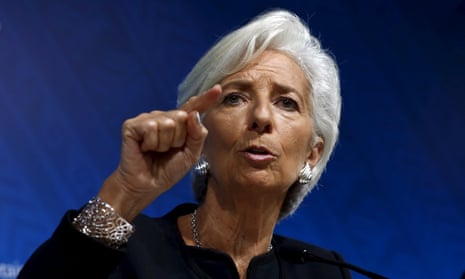The boss of the International Monetary Fund has urged global policymakers to build stronger buffers against volatile financial markets in a “rapidly changing and uncertain world”.
Speaking at the IMF’s annual meeting in Lima, Christine Lagarde denied the global economy was entering a “dark period” but said debts needed to be cut and greater international cooperation was needed to prevent recovery from being derailed.
Lagarde, who made a pitch for a second four-year term as the fund’s managing director, was careful to support the analysis of IMF economists, who have emphasised that growth has slowed this year and financial risks increased.
She said China’s slowdown and the recent turmoil in financial markets were likely to be features of the global economy for some time and would generate uncertainty as the growth patterns of developed and developing countries diverged. However, she said an overall slowdown was not inevitable should governments act to support growth and reduce debt.
The IMF cut its global growth forecast to 3.1% this year and 3.6% in 2016, the second downgrade this year. The slowdown has persisted despite central banks in major industrial economies cutting interest rates to near zero and stimulating their economies with $7tn (£4.6tn) in quantitative easing in the seven years since the global financial crisis.
Investment, growth and productivity are stuck below pre-crisis levels and confidence remains low, sapping business and consumer demand.
“An extended period of monetary accommodation in advanced economies has led to pockets of financial vulnerabilities,” Lagarde said, adding: “Safeguarding financial stability while promoting real investment remains a major policy challenge.”
Lagarde praised the efforts of the UK government to boost infrastructure spending over the next five years, saying that such spending was always beneficial “if there is enough stability” and when governments were able to persuade investors that debt levels were manageable.
Leaders need to add three ingredients to their mix of policies – to manage economic transition, watch out for spillover effects from financial markets and embrace international cooperation, she said.
In contrast to her comments about the UK, Lagarde said the eurozone must do more to revive investment. “Invigorating waning productivity will involve infrastructure investments, removing product and labour market barriers and providing better incentives for innovation,” she said.
The former French finance minister has spent much of the last four years steering the IMF through the Greek crisis, which almost resulted in the country’s bankruptcy and exit from the euro currency bloc.
IMF officials have made it known they are unwilling to participate in a third bailout negotiated between Athens and Brussels in the summer without a large debt write-off. Lagarde said it was too early to say how the bailout will evolve and whether the IMF would participate, before talks had begun.
But she urged countries to cooperate on a wide range of economic issues to reduce uncertainty.
Lagarde said: “Cooperation is vital in areas such as the global financial safety net, trade, climate change, international taxation, sustainable development goals, and demographic transitions and migration.”

Comments (…)
Sign in or create your Guardian account to join the discussion